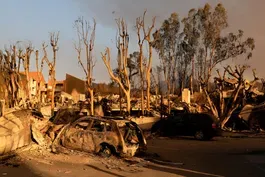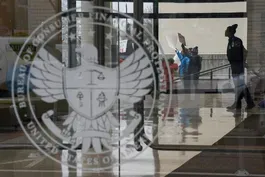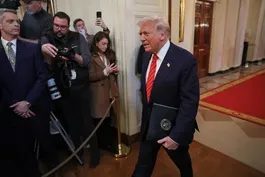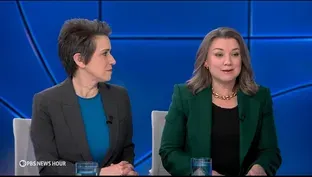
Chad Wolf on Trump's progress in reshaping immigration
Clip: 2/10/2025 | 7m 42sVideo has Closed Captions
Chad Wolf breaks down Trump's progress in reshaping America's immigration system
President Trump spent his first weeks in office reshaping much of the American immigration system through executive actions and working to see through a campaign promise of mass deportations. Amna Nawaz discussed the developments with Chad Wolf, the former acting DHS secretary and current executive director of the conservative think tank America First Policy Institute.
Major corporate funding for the PBS News Hour is provided by BDO, BNSF, Consumer Cellular, American Cruise Lines, and Raymond James. Funding for the PBS NewsHour Weekend is provided by...

Chad Wolf on Trump's progress in reshaping immigration
Clip: 2/10/2025 | 7m 42sVideo has Closed Captions
President Trump spent his first weeks in office reshaping much of the American immigration system through executive actions and working to see through a campaign promise of mass deportations. Amna Nawaz discussed the developments with Chad Wolf, the former acting DHS secretary and current executive director of the conservative think tank America First Policy Institute.
How to Watch PBS News Hour
PBS News Hour is available to stream on pbs.org and the free PBS App, available on iPhone, Apple TV, Android TV, Android smartphones, Amazon Fire TV, Amazon Fire Tablet, Roku, Samsung Smart TV, and Vizio.
Providing Support for PBS.org
Learn Moreabout PBS online sponsorshipAMNA NAWAZ: President Trump# has spent his first weeks in## office reshaping much of the American# immigration system through executive## actions and working to see through a# campaign promise of mass deportations.
For more on all of this, I'm joined now by Chad# Wolf.
He's former acting secretary of homeland## security in the first Trump administration# and the current executive director of the## America First Policy Institute.# That's a conservative think tank.
Secretary Wolf, welcome back.# Thanks for being with us.
CHAD WOLF, Former Acting U.S. Secretary# of Homeland Security: Well, thanks for## having me.
Good to b.. AMNA NAWAZ: So, White House# Press Secretary Karoline## Leavitt said last week that about more than# 8,000 people had been arrested in immigra.. enforcement actions since President# Trump was inaugurated on January 20.
We have seen reports recently that# the president has been unhappy with## the pace of arrests and deportations.# When you talk to people on the inside,## what do they tell you about the challenges# of meeting some of these expectations?
CHAD WOLF: Yes, well, the number I# have got is a little over 11,000,## but I think it's a good first step.
I think we got to remember that we're only three,# going on the fourth week of the administration.## So scaling up the number of folks removed# from the country is going to take a little## time.
I think they want immediate results,# given where the president has been on this,## but there -- as you indicate,# there are challenges to doing that.
Both you need manpower to# target and arrest individuals,## and then you need detention space to put# them in as they're being flown out of the## country.
So all that takes logistics.
It# takes scaling up to be able to do that.
But, look, it's three -- like I said, three weeks,## four weeks into the -- into this# effort, and they're at a very high rate.
AMNA NAWAZ: And we have seen, of course, of the# pace slowing a little bit.
I think the highest## single-day arrest total we saw was about 1,100,# over 1,100 early in Mr. Trump's administration.
And correct me if I'm wrong, but there# was reporting that, of that total,## about half of all of those so, about 600 people# or so, were arrested as criminal arrests.## The rest were what you call nonviolent# offenders on civil immigration charges.
Is that your understanding of the trend,## about half of everyone arrested so# far has been on a criminal arrest?
CHAD WOLF: I haven't seen the# exact breakdown of criminal versus## non-criminal arrest within that overall# number, but that doesn't surprise me.
Look, they're going to target the worst of the# worst, those criminal aliens.
But what they have## also said is, as they target these individuals and# they have to go into these neighborhoods and these## cities, that they're not going to ignore other# individuals that they come into contact with,## meaning other individuals that are here# in the country illegally and don't have## a legal right to be here, what they# often refer to as collateral arrests.
And so what we saw during the Biden# administration is, they would not detain## those individuals.
They wouldn't deport# them.
The Trump administration has said,## well, that's ignoring the law.
We're not# going to do that.
We're going to let ICE do## their job.
And so I think you're starting to# see more and more of those types of arrests,## as they continue to roll out and look for those# violent and dangerous individuals as well.
AMNA NAWAZ: And so, if that's# the case, can you clarify for us?
Because, as you know, there are a lot of# ways people can have protected status here,## temporary protected status, TPS, for hundreds# of thousands of people.
DACA is another form## of that protection, the Deferred Action for# Childhood Arrivals.
You probably saw there## was a report out of Florida about a middle# school teacher who was a DACA recipient,## a 24-year-old teacher there, who was reportedly# detained, arrested and deported back to Honduras## after appearing for what the union said# was a regular immigration appointment.
And that's caused a lot of concern# for people.
Can you just clarify,## if someone has DACA, are they# protected from deportation?
CHAD WOLF: Yes, look, there's a number of relief# that the U.S. government provides to folks.
So whether that's temporary protective status --# obviously, you mentioned DACA.
They could be in## the middle of their asylum proceedings, right?# All of those measures and relief have an ongoing## process that you have to adhere to, unless# those individuals for any number of reasons## fall out of status, and so they could commit a# crime.
They could do any -- a number of other## things that make them fall out of status# and then therefore eligible for removal.
But if you do have some type of relief# or you're in a process of doing that,## then it's -- you're obviously# not eligible to be removed.
AMNA NAWAZ: Can I ask if you can share anything# to help clarify some of the deportation flights## we have seen to Guantanamo Bay?# My understanding is there's been## a few military flights already.
It's been# reported between 60 and 70 people so far.
We have heard President Trump say# that this is where what he calls## sort of the worst of the worst will# be sent.
What is the bar for deporting## someone to Guantanamo?
Do they have to be# convicted of a violent crime, for example?
CHAD WOLF: Well, again, they're# using Guantanamo Bay as, again,## a staging area.
Any time that you target# an individual, arrest an individual,## you have to put them in a bed in order to# hold them in order to line up a deportation## flight back to their home country# or back to another third country.
So they're using Guantanamo Bay# as a staging ground.
And, again,## the Coast Guard has done this in the past# with Haitian migrants, with Cuban migrants## that they pick up at sea.
So that facility# has some muscle memory on how to do that.
And, obviously, for the number of arrests# that this administration wants to see as## they continue to scale up, they're# going to need more and more beds,## whether that is through the military at places# like Guantanamo Bay or that's through state and## local sheriffs or that's through private# contractors.
They're going to need more## capacity to hold individuals as they line up# flights to remove them out of the country.
AMNA NAWAZ: Well, we should clarify, I# guess, the U.S. hasn't really held people## en masse there from Cuba and Haiti since the# 1990s.
That generally stopped in 1996.
And,## since then, there's been fewer than 100# or so migrants held at the facility there.
But, again, the bar for deporting someone# from United States soil to Guantanamo Bay,## is it clear to you where that is?
CHAD WOLF: Well, I have continued# to hear the worst of the worst.
But it really doesn't matter what they# have done.
If you're eligible for removal,## then they can move you to places like Guantanamo# Bay.
They can move you to other places that they## have here in the United States in Texas# and Arizona and other places.
Again,## it's just a holding facility so that then# you can be put on an aircraft and flown back## to either your home country or another# country that's going to repatriate you.
AMNA NAWAZ: While I have you, I want to get a big# picture question in here, because the agency that## you used to lead, the Department of Homeland# Security, which has the third largest federal## department by work force, was targeted in that# outline in Project 2025 that was looking for ways## to reshape the incoming Trump administration as# a department that could be eliminated wholesale.
And when you look at now the actions# taken by Elon Musk and his team,## looking for efficiencies, places to cut# the work force, what's your view on that?## Should the Department of Homeland Security# be eliminated or dramatically scaled back?
CHAD WOLF: I would not advocate# for wholesale abolishment of DHS,## but is there places where you# can trim the fat?
Absolutely.
So whether DOGE wants to come in or other# groups of individuals should come in,## take a hard look at the department.
Where are# they meeting their statutory mandate?
Where## have they grown or had that mission creep# over a period of time?
And where can they## scale back?
Save the American taxpayer some# money, but continue to keep America safe,## protect the homeland and do what was# originally envisioned by Congress.
AMNA NAWAZ: That's former Acting# Secretary of Homeland Security Chad Wolf,## now the executive director of the# America First Policy Institute.
Secretary Wolf, thank you.
Good to speak with you.
CHAD WOLF: Thank you.
California faces insurance crisis amid extreme weather
Video has Closed Captions
California faces insurance crisis as homeowners lose coverage amid extreme weather (9m 6s)
Ex-CFPB director discusses Trump's effort to shut agency
Video has Closed Captions
Former CFPB director says Trump 'begging for another financial crisis' by closing agency (5m)
How the courts may serve as a check on Trump's presidency
Video has Closed Captions
How the courts may serve as a check on Trump's presidency (8m 38s)
Judge says Trump ignoring his order to pause funding freeze
Video has Closed Captions
Federal judge says Trump administration ignoring his order to pause funding freeze (3m 35s)
News Wrap: Hamas accuses Israel of breaking ceasefire deal
Video has Closed Captions
News Wrap: Ceasefire at risk as Hamas accuses Israel of breaking parts of agreement (4m 43s)
Tamara Keith and Amy Walter on Trump approval polls
Video has Closed Captions
Tamara Keith and Amy Walter on what the American public thinks about Trump's 2nd term (8m 24s)
Trump escalates trade battle with steel, aluminum tariffs
Video has Closed Captions
Trump escalates his trade battles with new tariffs on steel and aluminum (4m 54s)
Providing Support for PBS.org
Learn Moreabout PBS online sponsorshipMajor corporate funding for the PBS News Hour is provided by BDO, BNSF, Consumer Cellular, American Cruise Lines, and Raymond James. Funding for the PBS NewsHour Weekend is provided by...



















